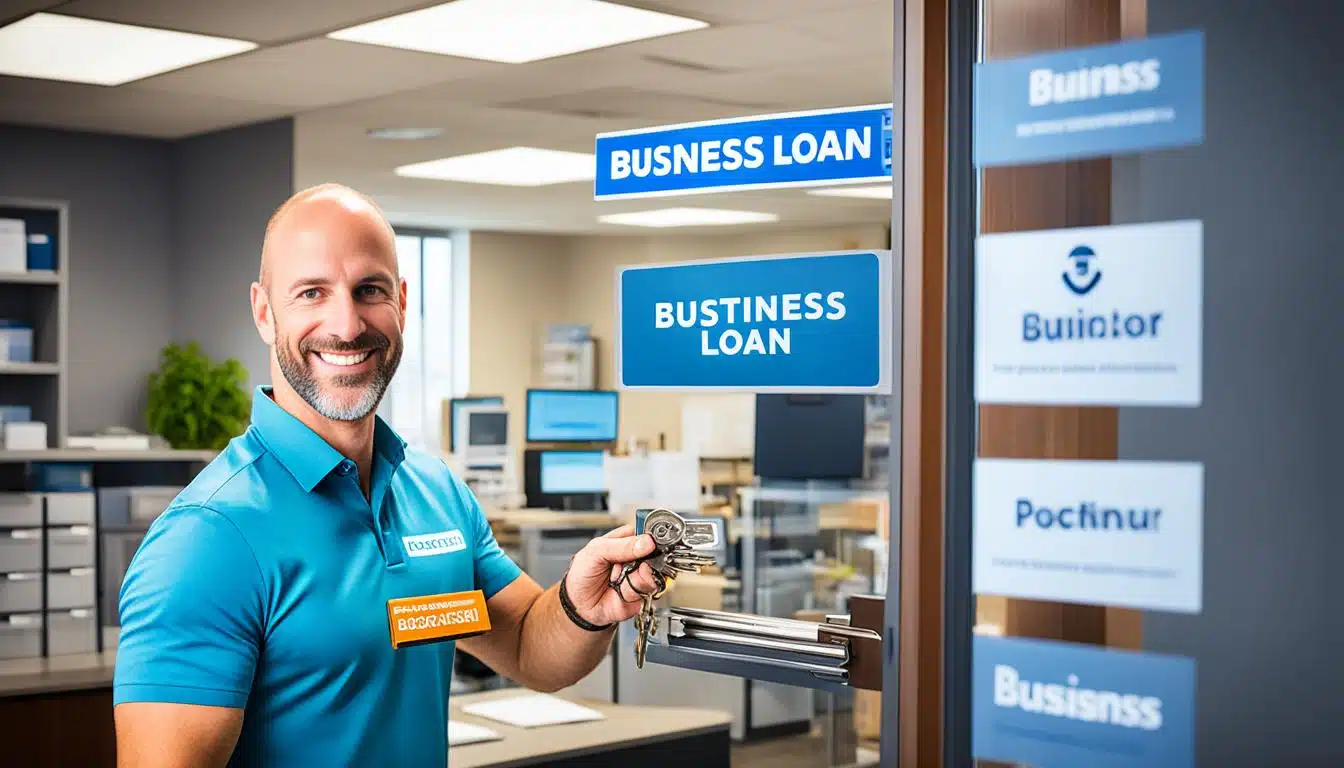According to the Small Business Administration, small businesses make up 99.9% of all U.S. businesses. However, accessing credit can be a challenge for small businesses, especially in today’s economic environment. Rising interest rates and conservative lending practices by banks have made it harder for small businesses to obtain financing. Business owners need to carefully consider the timing of their loan, the type of loan they need, and how to demonstrate their ability to repay the loan.
- Small businesses make up 99.9% of all U.S. businesses.
- Accessing credit can be a challenge for small businesses.
- Rising interest rates and conservative lending practices have made it harder for small businesses to obtain financing.
- Business owners need to carefully consider the timing of their loan and the type of loan they need.
- Demonstrating the ability to repay the loan is essential.
The Importance of Timing for a Business Loan
Timing plays a crucial role when it comes to obtaining a business loan. With rising borrowing costs and tighter credit conditions compared to two years ago, business owners need to carefully consider the timing of their loan application. Banks have become more selective in assessing loan requirements, making it imperative for businesses to consult with their bank for guidance on timing and explore alternative finance options.
Why is timing important for a business loan?
“The lending landscape has changed significantly over the past few years, and business owners must be strategic in their loan application timing. By understanding the current lending climate and aligning their financing needs accordingly, businesses can enhance their chances of securing the necessary funding,” says John Smith, a small business finance expert.
Consulting your bank for guidance
In order to optimize the timing of your loan application, it is advisable to consult with your bank. Banks have valuable insights into the current lending market and can provide guidance on when the most favorable loan conditions may be available. By leveraging their expertise, you can assess whether it is the right time to apply for a loan or if it may be more advantageous to wait.
Explore alternative finance options
In addition to consulting with your bank, it is essential to explore alternative finance options. Traditional bank loans are not the only source of funding available to businesses. Online lenders, credit unions, and other non-traditional financing options may offer more flexible terms and lower loan requirements. By considering these alternatives, you can increase your chances of finding suitable finance options that align with your timing needs.
Understanding the impact of timing
The timing of your loan application can significantly impact both your chances of approval and the terms of the loan. Applying for a loan when borrowing costs are high or credit conditions are tight may result in higher interest rates or more stringent requirements. On the other hand, applying during a period of favorable conditions can lead to more competitive loan terms and higher approval chances.
“Timing is everything when it comes to obtaining a business loan. Being aware of the current loan landscape and carefully planning your loan application can make a significant difference in securing the financing you need,” advises Mary Johnson, a finance consultant.
| Timing Factors | Impact on Loan Application |
|---|---|
| High borrowing costs | Higher interest rates |
| Tight credit conditions | More stringent loan requirements |
| Favorable loan climate | Lower interest rates, more competitive terms |
| Strategic loan timing | Increased approval chances |
Types of Loans and New Credit Options
Different types of loans serve different purposes, catering to the specific financial needs of businesses. Understanding these options can help business owners make informed decisions when seeking financing. Some common types of loans include:
Small Business Administration (SBA) Loans
SBA loans are designed to support small businesses and startups. These loans are guaranteed by the Small Business Administration and are issued by participating lenders. They offer favorable terms and lower interest rates, making them an attractive option for businesses seeking capital.
Franchise Business Loans
Franchise businesses often have specialized financing needs. Commercial and regional banks have experience working with franchise businesses and can provide tailored financial solutions to support their growth and expansion.
Working Capital Lines of Credit
Working capital loans provide businesses with access to funds for day-to-day operations. These lines of credit allow businesses to manage cash flow, cover operational expenses, and seize growth opportunities when they arise.
Commercial Real Estate Loans
Commercial real estate loans help businesses purchase or refinance properties for their operations. These loans can be used to acquire office space, retail locations, warehouses, and other properties necessary for business operations.
Commercial and Industrial (C&I) Loans
C&I loans are designed to meet the unique financing needs of businesses operating in various industries. Whether it’s manufacturing, construction, or technology, C&I loans provide the necessary capital for purchasing equipment, upgrading machinery, and expanding operations.
Business owners should explore these different loan options, considering their specific needs and circumstances. It’s important to work with reputable lenders who have expertise in the relevant industry and loan type.
| Loan Type | Purpose | Key Features |
|---|---|---|
| Small Business Administration (SBA) Loans | Support small businesses and startups | Favorable terms, lower interest rates, guaranteed by the SBA |
| Franchise Business Loans | Support franchise businesses with specialized financing needs | Tailored solutions, expertise in working with franchises |
| Working Capital Lines of Credit | Provide funds for day-to-day operations and cash flow management | Flexibility, easy access to funds when needed |
| Commercial Real Estate Loans | Acquire or refinance properties for business operations | Longer repayment terms, funding for property purchase |
| Commercial and Industrial (C&I) Loans | Meet the unique financing needs of businesses across industries | Catered to specific industries, financing for equipment and machinery |
Factors Affecting Approval Odds for a Business Loan
When applying for a business loan, there are several factors that can influence your chances of approval. Lenders will carefully evaluate these factors to assess your creditworthiness and determine if they should extend financing to your business. Understanding these factors and taking steps to address them can significantly improve your approval odds.
The Importance of a Well-Defined Business Plan
A well-defined business plan is a crucial aspect of loan approval. It provides lenders with a clear understanding of your business and its potential for success. Your business plan should include detailed financial projections, market analysis, and a comprehensive strategy for growth.
“A well-crafted business plan not only showcases your vision and goals but also demonstrates that you have thoroughly thought through the financial aspects of your business. It shows lenders that you have a clear roadmap for success and are a low-risk investment.”
The Role of Credit Score
Your personal and business credit scores play a significant role in loan approval. Lenders assess your creditworthiness based on your credit history, including factors such as payment history, credit utilization, and any past delinquencies.
Pro Tip: Maintaining a good credit score is crucial for loan approval. Paying bills on time, reducing credit card balances, and resolving any outstanding debts or discrepancies can help improve your credit score.
The Potential for Equity Contribution
Lenders prefer borrowers who have a stake in the business. Having a personal equity contribution shows lenders that you have a financial commitment to your business and are willing to share the risk. This can significantly increase your chances of loan approval.
The Power of a Cosigner
If you have a weak credit score or insufficient collateral, having a cosigner with a strong credit history can improve your approval odds. A cosigner acts as a guarantor for the loan, providing an added layer of security for the lender.
The Role of Collateral
Collateral is an asset that you pledge to secure the loan. It provides lenders with an additional layer of protection in case of default. The type and value of collateral can vary based on the loan type and lender requirements.
| Factors Affecting Approval Odds: | Importance: |
|---|---|
| Well-Defined Business Plan | High |
| Credit Score | High |
| Equity Contribution | Medium |
| Cosigner | Medium |
| Collateral | Low |
By understanding and addressing these factors, business owners can enhance their chances of loan approval and secure the financing they need to fuel their growth and success.
Understanding Secured Business Loans
When considering financing options for your business, it’s essential to understand secured business loans. Secured loans require borrowers to provide collateral that acts as a guarantee for repayment. This collateral can be in the form of physical assets such as property, equipment, or inventory. It can also include financial assets like invoices or savings. By providing collateral, borrowers reduce the lender’s risk and increase their chances of securing larger loan amounts, lower interest rates, and longer repayment terms.
One method of securing a business loan is through a personal guarantee. A personal guarantee is a commitment from the business owner to repay the loan using personal assets if the business is unable to do so. This provides an additional layer of security for the lender.
Another method of securing a business loan is through a Uniform Commercial Code (UCC) lien. A UCC lien is a legal claim against the borrower’s assets, giving the lender the right to seize and sell those assets to recoup their losses if the borrower defaults on the loan.
Secured business loans offer benefits for both borrowers and lenders. For borrowers, these loans provide access to larger sums of money, lower interest rates, and longer repayment terms. This can be particularly beneficial for businesses that require significant capital investments or have long-term growth plans. Lenders, on the other hand, benefit from the reduced risk associated with collateral. It provides them with a higher level of assurance that they will recoup their funds even if the borrower defaults on the loan.
Secured business loans are a common financing option for small businesses, especially those with limited credit history or less established financials. However, it’s crucial to carefully consider the collateral being offered and ensure its value aligns with the loan amount. This evaluation helps protect both the borrower and the lender.
Advantages of Secured Business Loans:
- Larger loan amounts
- Lower interest rates
- Longer repayment terms
- Higher chances of loan approval
Disadvantages of Secured Business Loans:
- Risk of losing assets used as collateral
- Time-consuming collateral evaluation process
Secured business loans provide businesses with the opportunity to access the capital they need for growth and expansion. By understanding the concept of collateral, personal guarantees, and UCC liens, business owners can make informed decisions about their financing options.
Comparing Secured and Unsecured Business Loans
When seeking a business loan, it’s essential to understand the differences between secured and unsecured loans. These two loan types have distinct features, including collateral requirements, loan terms, and interest rates.
Secured Business Loans:
Secured business loans require collateral, which can be physical or financial assets that secure the loan. Physical assets may include property, equipment, or inventory, while financial assets can be invoices or savings. Depending on the loan type, lenders may also require personal guarantees or Uniform Commercial Code (UCC) liens.
Collateral reduces the lender’s risk and allows for larger loan amounts, longer repayment terms, and lower interest rates. By providing collateral, businesses demonstrate their commitment and ability to repay the loan, enhancing their chances of approval. However, it’s important to note that if the loan cannot be repaid, the collateral may be at risk.
Unsecured Business Loans:
Unlike secured loans, unsecured business loans do not require collateral. These loans are based on the creditworthiness and financial history of the borrower, making them a viable option for businesses without substantial physical or financial assets to pledge as collateral.
While unsecured loans offer greater flexibility, they often come with shorter repayment timelines and higher interest rates compared to secured loans. Lenders compensate for the higher risk by imposing stricter terms and charging higher interest rates.
Key Differences:
| Factors | Secured Business Loans | Unsecured Business Loans |
|---|---|---|
| Collateral Requirement | Physical or financial assets | No collateral required |
| Loan Terms | Longer repayment timelines | Shorter repayment timelines |
| Interest Rates | Lower interest rates | Higher interest rates |
When deciding between secured and unsecured business loans, it’s crucial to assess your specific needs, repayment capabilities, and risk tolerance. Secured loans provide access to larger loan amounts with favorable terms, whereas unsecured loans offer greater flexibility but come with higher interest rates and shorter repayment timelines.
By carefully evaluating your financial situation and loan requirements, you can make an informed decision that aligns with your business goals and sets you on the path to success.
Pros and Cons of Secured Business Loans
Secured business loans offer several advantages and disadvantages for business owners. Understanding the pros and cons can help you make an informed decision when considering this type of financing for your business.
Pros of Secured Business Loans
- Better Loan Terms: Secured loans often come with favorable loan terms such as lower interest rates and longer repayment periods. This can result in lower monthly payments and reduced financial strain on your business.
- Increased Chances of Approval: Securing a loan with collateral increases your chances of loan approval, even if you have less-than-perfect credit. Lenders feel more confident with collateral as it provides assurance that they can recover their funds in case of default.
- Access to Larger Loan Amounts: With collateral at stake, lenders are more willing to provide larger loan amounts. This can be beneficial if you have significant financing needs for expanding your business, purchasing equipment, or funding other growth initiatives.
Cons of Secured Business Loans
- Assets at Stake: The main disadvantage of secured loans is the risk of losing assets used as collateral if the loan cannot be repaid. This can include property, equipment, inventory, or other valuable assets. Before opting for a secured loan, carefully assess the assets you’re putting at stake and consider the potential consequences.
- Longer Funding Process: Secured loans typically require more documentation and appraisal of collateral, which can lengthen the loan approval and funding process compared to unsecured loans. If you need quick access to funds, a secured loan might not be the most suitable option.
It’s important to weigh the pros and cons of secured business loans based on your specific situation and goals. Lenders often provide information on the loan terms, approval requirements, and risks associated with secured financing. Consider consulting with financial professionals or loan officers to gain additional insights and ensure you make the right decision for your business.
Where to Get a Secured Business Loan
Secured small-business loans are available from banks, credit unions, and online lenders. Each option comes with its own set of considerations, benefits, and drawbacks. Understanding the differences can help business owners make an informed decision when seeking financing.
Banks and Credit Unions
Banks and credit unions offer secured business loans and are often the go-to choice for many entrepreneurs. They typically have competitive interest rates and may offer personalized service tailored to the needs of businesses. However, banks and credit unions tend to have stricter qualifications, and the approval process can be more time-consuming.
Online Lenders
Online lenders provide more flexible eligibility criteria and can be a good option for business owners who may not meet traditional lending requirements. They often have faster funding processes, allowing businesses to access the funds they need more quickly. However, it’s important to note that online lenders may have higher interest rates than banks and credit unions.
Different Loan Types
When considering where to get a secured business loan, it’s essential to explore the loan types offered by different lenders. Traditional term loans, Small Business Administration (SBA) loans, and business lines of credit are common options available from banks, credit unions, and online lenders. Each loan type has its own features and benefits, so it’s important to match the loan type with the specific financing needs of the business.
Shop Around for Competitive Rates
Regardless of the lending institution, business owners should compare rates and terms to ensure they are getting the best deal possible. Shopping around allows for a more comprehensive understanding of the available options and helps identify the lender that offers the most competitive rates and terms for the business’s needs.
When choosing where to get a secured business loan, it’s important to consider factors such as the lender’s reputation, customer service, loan terms, and interest rates. By carefully assessing these factors and weighing the pros and cons, business owners can find the right lender that meets their financial needs and supports their growth.
How to Secure a Long-Term Business Loan
When it comes to securing a long-term business loan, there are several key factors that business owners need to consider. By carefully evaluating their funding needs, qualifications, collateral assessment, and engaging in comparison shopping, business owners can better navigate the loan application process and secure the best financing deal for their business plans.
To start, business owners must determine their funding needs. This involves evaluating the specific amount of capital required to achieve their growth objectives. By having a clear understanding of their financial requirements, business owners can effectively communicate their funding needs to potential lenders, increasing their chances of obtaining the necessary financing.
Qualifications are crucial when applying for a long-term business loan. Lenders will consider factors such as the business owner’s credit history, business revenue, and years in operation. To improve their qualifications, business owners should focus on maintaining a strong credit score, ensuring they have accurate financial records and demonstrating their ability to generate consistent revenue.
Collateral assessment is another important aspect of securing a long-term business loan. Lenders may require collateral as security for the loan. This collateral can range from physical assets such as property or equipment to financial assets like accounts receivable or inventory. Business owners should assess the value of their collateral and consider how it may impact their loan terms and approval chances.
Comparison shopping is essential when seeking a long-term business loan. Business owners should research and compare various lenders to find the best financing deal. Factors to consider include interest rates, repayment terms, fees, and customer reviews. By carefully evaluating their options, business owners can make an informed decision and secure a favorable loan for their long-term business goals.
Also Read : US Bank Auto Loan: Easy Financing for Cars
The loan application process can be lengthy and rigorous. Business owners should be prepared to provide detailed financial records, including profit and loss statements, balance sheets, and cash flow projections. These documents help lenders assess the business’s financial stability and ability to repay the loan. By having these records ready and organizing them effectively, business owners can streamline the application process.
Securing a long-term business loan requires careful planning and thorough preparation. By determining funding needs, evaluating qualifications, assessing collateral, engaging in comparison shopping, and completing a comprehensive loan application, business owners can position themselves for success and secure the capital they need to fuel their business growth.
Conclusion
Long-term business loans are an essential tool for fueling the growth and expansion of businesses. With loan terms ranging from 2 to 20 years or more, these loans provide the necessary capital to make long-term investments that drive business growth.
When considering a long-term business loan, it is crucial for business owners to carefully evaluate their options and determine their goals for the loan. By assessing their specific needs and financial situation, business owners can select the type of loan that best aligns with their unique requirements.
By securing a long-term business loan, businesses can move forward with confidence in their growth plans. The financial stability and extended repayment terms offered by these loans allow businesses to make strategic investments in areas such as expansion, equipment, technology, and marketing, fostering long-term growth and success.
FAQ
Q: What is a small business loan?
A: A small business loan is a type of loan designed specifically to help small businesses with financing for various business needs.
Q: What factors determine the interest rate on a business loan?
A: The interest rate on a business loan is determined by factors such as the loan program, years in business, personal credit, and the type of loan being sought.
Q: What are the options available when seeking a business loan?
A: When seeking a business loan, you have options such as equipment loans, auto loans, and various types of business financing depending on your business needs.
Q: How can I get a business loan?
A: To get a business loan, you typically need to apply with business lenders, meet certain qualifications such as time in business and business assets, and go through the application process.
Q: What are the common business needs that can be fulfilled by a loan?
A: A business loan can help with major fixed assets, working capital, equipment financing, and other business expenses that require funding.
Q: What are the loan terms typically associated with business loans?
A: Loan terms for business loans can vary, including factors like the term length, repayment schedule, interest rate, and whether it is a short-term or long-term loan.
Q: What is the application process like for applying for a small business loan?
A: The application process for applying for a small business loan may involve providing documentation, business financials, and going through a review process with the lender.











